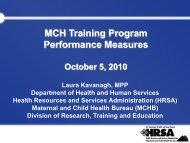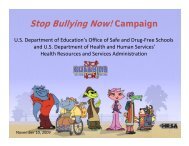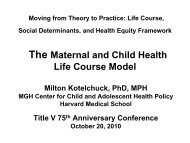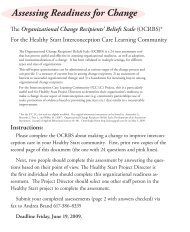Transcript - HRSA
Transcript - HRSA
Transcript - HRSA
You also want an ePaper? Increase the reach of your titles
YUMPU automatically turns print PDFs into web optimized ePapers that Google loves.
2011 AMCHP and Family Voices National Conference: Plenary III: Story<br />
Telling: The First Big Thing<br />
02/15/2011 Omni Shoreham, Washington, D.C.<br />
Melinda Sanders: Good morning. It's Tuesday, February 15th, and you made it this far. We<br />
have a fabulous day today. I'm Melinda Sanders, the treasurer of AMCHP<br />
and so glad to welcome our Family Voices partners to this shared general<br />
session on storytelling, the first big thing. We have some fabulous<br />
speakers this morning and I think you'll find it is totally invigorating,<br />
enlightening and it will change your life. And to end it we also have<br />
regional baskets to give out from regions 5, 6 and 7. I don't know if<br />
anybody is a packer fan but I see a lot of packer stuff in the region five<br />
basket. Probably some Super Bowl items in there. We're so pleased this<br />
morning to have with us the United States Surgeon General, Dr. Regina<br />
Benjamin. She's the 18th Surgeon General of the United States and she's<br />
America's doctor. She provides the public the best scientific information<br />
available on how to improve their health and the health of the nation. In<br />
that role, she also has operational command of over 6500 health officers<br />
located throughout the globe to promote, protect and advance the health of<br />
the American people. Dr. Benjamin was also the founder and former<br />
CEO of the Bayou La Batre Rural Health Clinic in Alabama. The former<br />
associate dean for rural health at the University of South Alabama in<br />
Mobile, USA, those of you familiar with that institution and the immediate<br />
past chair of the state medical boards of the United States. As if that isn't<br />
enough, in 1995 she was the first physician under the age of 40 and the<br />
first African-American woman to be elected to the American Medical<br />
Association board of trustees. [Applause] She served as president of the<br />
AMA education and research foundation and chair of the AMA's council<br />
on ethical and judicial affairs. She was the first African-American<br />
president of an American medical society in the United States. She is a<br />
lady of lots of firsts. Dr. Benjamin, we thank you for your leadership and
2011 AMCHP and Family Voices National Conference: Plenary III: Story<br />
Telling: The First Big Thing<br />
02/15/2011 Omni Shoreham, Washington, D.C.<br />
for being a person of so many firsts, including promoting breastfeeding as<br />
the first choice for women and their newborns. [Applause] We are so<br />
pleased that you could be with us. Please help me join in welcoming Dr.<br />
Benjamin. [Applause]<br />
VADM Regina M. Benjamin MD, MBA: Well, good morning. Thank you for that wonderful<br />
welcome. That is really nice, thank you. I'm so glad to be here. I wasn't<br />
sure who you were talking about, though. [Laughter] It is really<br />
wonderful that so many leaders from so many communities across the<br />
country have come together so that we can work to improve maternal and<br />
child health. Community and state leaders like you bring an incredible<br />
amount of energy and new ideas to our efforts as we try to improve public<br />
health. I understand this is a storytelling session, which is good. I have<br />
lots of stories. But the first one is about a young infant, as you can tell I'm<br />
an admiral. I'm a three-star admiral even my title is Surgeon General.<br />
That's a story for another day. There was a young man on duty one night<br />
on a battle ship. He had the watch. Everything was going fine and saw a<br />
light in the distance and plotted the course and realized it was in the direct<br />
path of a great battleship. He flashed out a warning. You are in the path<br />
of a great battleship, alter your course. No reply. So he went and got his<br />
Captain. The Captain came and assessed the situation, plotted out the<br />
course and came to the same conclusion. So the Captain flashed out a<br />
warning. You are in direct path of a great battleship, alter your course<br />
immediately. They waited for a reply. No reply. So by this time it was<br />
getting pretty late so they had to wake up the admiral and like any good<br />
leader, the admiral said if you want something done right, you do it<br />
yourself. So the admiral plotted out the course and came to the same<br />
conclusion. So he flashed out a warning, you are in the direct path of a<br />
great battleship. Alter your course immediately. I am an admiral.
2011 AMCHP and Family Voices National Conference: Plenary III: Story<br />
Telling: The First Big Thing<br />
02/15/2011 Omni Shoreham, Washington, D.C.<br />
[Laughter] So they waited for a reply. No reply. They waited. Still no<br />
reply. Finally the reply came back. No, you alter your course, I am a<br />
lighthouse. [Laughter] And I believe that you and I have to be lighthouses<br />
to stand our ground when things are going to wrong direction. [Applause]<br />
Seems like the funding and underfunding of programs that we need very<br />
strongly Medicaid and Medicare programs like you're very familiar with,<br />
we need to change the direction of the great battleships and we can stand<br />
our grounds with that. I wanted to share with you how I got involved if<br />
organized medicine. When I was an intern I attended the University of<br />
Georgia's annual meeting and the issues debated were that sexually<br />
transmitted diseases need to be taught in medical school. I stood up in a<br />
room of 20 or 25 people and I said I had never seen certain diseases except<br />
in a textbook and I thought there was a need. The resolution passed and<br />
the Georgia delegation forwarded that resolution to the AMA. They sent<br />
me there to speak to the same issue. At the AMA the resolution passed<br />
and within six months every medical school in this country was<br />
encouraged to include sexually transmitted diseases as a core to their<br />
curriculum. I learned that one person can make a difference. [Applause]<br />
Whether it's a medical policy or medical practice. I learned I can make a<br />
difference in medical practice when the national health service corps sent<br />
me to Bayou La Batre. I found a community of working poor. Too poor<br />
to afford medical care but too rich to qualify for Medicaid. I liked the<br />
people and the community and I wanted to practice medicine there.<br />
Practicing medicine wasn't just sewing up shark bites. I had to deal with<br />
the regulators, reviewers, red tape dispensers and the paperwork that went<br />
along with it. I decided to stay involved in the community. Any<br />
organization or any group that would help get services to our community.<br />
In addition to the AMA and the medical associations and the county<br />
medical society, who was involved with me I was with Red Cross, Girl
2011 AMCHP and Family Voices National Conference: Plenary III: Story<br />
Telling: The First Big Thing<br />
02/15/2011 Omni Shoreham, Washington, D.C.<br />
Scouts, Chamber of Commerce, hospitals, any organization. And I also<br />
learned my patients had problems that my prescription pad by itself could<br />
not solve. Adequate housing especially after Katrina. Employment<br />
opportunities, clean water. For example, had a young girl who had had<br />
seizures and I had -- her name is Donna, sort of. She has had seizures for<br />
a long time. A young white girl 20 something with two little kids. Her<br />
seizures were under control. She started having them. I asked if she -- she<br />
said the pharmacist changed my medicine. She *** her pills. I used to<br />
take a solid one and now a take one that is striped and one in two different<br />
colors. What I realized was that Donna couldn't read. 20 something years<br />
old in today's world and could not read enough to know the difference in<br />
her medicine so we had to work to get adult literacy programs to the<br />
community. Another patient is Mrs. Smith. She is a 40-year-old African-<br />
American lady about that high and overweight and she called me on a<br />
Saturday because patients can call me. She called me and said Dr.<br />
Benjamin, my back is really, really hurting. I went to that specialist you<br />
sent me to for my slipped disk and he told me I needed to lose weight.<br />
I've been trying but this Ibuprofen is not strong enough and I said I can<br />
call you in something stronger but you have to come and see me on<br />
Monday or Tuesday. This is Saturday. She said I will. And sure enough<br />
on Tuesday I walk into the exam room and there Mrs. Smith is leaning<br />
over the exam table in so much pain that she could not sit down. And I<br />
said well, Mrs. Smith, did the medicine I called you in help at all? She<br />
says well, Dr. Benjamin, I didn't get it. But I get paid on Friday and I<br />
promise you I'll get it. What do you mean you didn't get it? She said I<br />
couldn't afford it. And I said but you work for the school system. You<br />
work in the custodial department, you have Blue Cross. She said I know,<br />
but I didn't have the co-pay but I promise I'll get it Friday. So I went out<br />
of the room and had my nurse go across and get her medicine. We
2011 AMCHP and Family Voices National Conference: Plenary III: Story<br />
Telling: The First Big Thing<br />
02/15/2011 Omni Shoreham, Washington, D.C.<br />
brought it back to her and I said well, you know, Mrs. Smith, you're in a<br />
lot of pain and here is your medicine. You need to start taking it and start<br />
to feel better. And at that moment her eyes welled up with tears and she<br />
said Dr. Benjamin, I'm so embarrassed. I didn't want you to have to do<br />
that. I realized at that moment I had taken her dignity from her. And that<br />
cultural competence isn't about the color of your skin, it's about allowing<br />
people to keep their dignity. And it was a big lesson for me and I had to<br />
figure out how to get out of it. So I told her about the fact that well, you<br />
know, after the hurricane we had a number of people who would give us<br />
small donations and we have a small pot of money for people like you<br />
who need help. If you want to pay it back on Friday you can but you don't<br />
have to. She was okay with that. But then as I was leaving the room, she<br />
said oh, by the way, the oh by the way was, she said, Dr. Benjamin can I<br />
get a work excuse? I said sure. Today is Tuesday, you want to start<br />
taking the medicine and go to work on Thursday or Friday and she said<br />
no, we have to strip those floors tonight, I have to go back to work. Here<br />
is a woman who is willing to strip the floors to have a clean environment<br />
for our kids to go to school when she's in so much pain she can't sit down.<br />
These are the people we advocate for and who you are advocating for and<br />
why you're inside on a beautiful day with no windows. People like her<br />
who are working to keep our country going. And so I was really pleased<br />
when the Affordable Care Act back in the fall passed and went into effect,<br />
the fact that preventive services are covered and cannot -- insurance<br />
cannot charge a co-pay for those preventive services. It was Mrs. Smith<br />
that I thought about at that moment in time, and people like her. So it was<br />
with mixed feelings that I was able to come to Washington and leave<br />
Bayou La Batre after 23 years of practice but I feel like I have 300 million<br />
Americans as my patients and hopefully treat them the same as every one<br />
of those patients. Really, especially grateful to serve at this historic time
2011 AMCHP and Family Voices National Conference: Plenary III: Story<br />
Telling: The First Big Thing<br />
02/15/2011 Omni Shoreham, Washington, D.C.<br />
when we make overdo changes in how we finance and deliver healthcare.<br />
Changes that will eventually give all Americans access to high-quality,<br />
affordable healthcare including mental health. But given American's<br />
healthcare coverage is only the first step to reducing the health disparities<br />
that plague our country. We know that reducing and eliminating health<br />
disparities are more than giving Americans the insurance card. We have<br />
to address the social determinants of health such as poverty. A study that<br />
was published in a December 2009 issue of American Journal of Public<br />
Health showed that poverty and drop-out rates are as an important a health<br />
problem as smoking is in the United States. On average poverty showed<br />
the greatest impact on health. Smoking second followed by being a high<br />
school drop-out, a non-Hispanic black, obese, a binge drinker and<br />
uninsured. The second step we have to do is one that is just as<br />
challenging, prevention. Prevention is the foundation of the public health<br />
system and prevention is a foundation of my work as Surgeon General.<br />
And I just want to take a minute to tell you that the Affordable Care Act<br />
provided historic funding commitment to promote prevention and<br />
wellness. Never has that happened in this country at this level. It<br />
established a national prevention, health promotion and public health<br />
council which I share. This council will provide coordination and<br />
leadership to ensure that government is focused on prevention. Developed<br />
the first ever national prevention strategy. So with this council I hope to<br />
move us from a system of sick care to a system based on wellness and<br />
prevention. As a family physician in solo practice, I, like many of you,<br />
have seen so many missed opportunities for prevention in our healthcare<br />
settings across this nation. If we truly want to reform our healthcare in<br />
this country, we need to prevent people from getting sick in the first place.<br />
[Applause] We need to stop the disease and stop it before it starts. In<br />
addition to the state-of-the-art medicine we need a new approach to
2011 AMCHP and Family Voices National Conference: Plenary III: Story<br />
Telling: The First Big Thing<br />
02/15/2011 Omni Shoreham, Washington, D.C.<br />
promoting prevention in our communities. Staying healthy depends on<br />
other factors like housing and transportation, education, availability of<br />
quality and affordable food in our workplaces, environment and mental<br />
health systems. I want to change the way we think about health in this<br />
country and that calls for us to take a more holistic approach to<br />
community health. Safe highways and work site wellness programs to<br />
clean air and healthy foods. We want to get to a place where everyone<br />
understands that almost everything we do, even though it's not labeled as<br />
health or as prevention, really does affect the health and equality of all<br />
Americans and particularly are children. My priorities at Surgeon General<br />
focus on prevention and there are so many different programs that I'm<br />
interested in. I'm a family doctor. I like everything. So things like<br />
breastfeeding, which was mentioned, smoking and particularly smoking<br />
within our youth. Violence and youth violence. Domestic violence,<br />
violence in workplace. The smoking papers we have that has come out<br />
we're coming out very shortly in the spring with a I guess it's a call to<br />
action or a report on youth and their misuse of prescription drugs. It's a<br />
major, major problem in this country and a number of other projects we're<br />
focusing on and I hope to come back and talk to you about every one of<br />
them. I'm passionate about them all. What I want to leave you with<br />
today, you are the leaders and people look up to you. So you have a lot on<br />
your plate and you're doing a lot. And I want you to remember to take<br />
some time for yourself. This is my doctor thing to you now. I'm treating<br />
my 300 million American patients. On the airplane yesterday, the flight<br />
attendant said put your own facemask on before attempting to help others.<br />
You have to take care of yourself, you need to exercise, eat well, do things<br />
you enjoy, have fun, distress. You don't want to have a heart attack and<br />
you aren't good for anybody if you do that. And take your flu shot.<br />
[Laughter] [Applause] So I'll end with, I have a lot of stories but I think
2011 AMCHP and Family Voices National Conference: Plenary III: Story<br />
Telling: The First Big Thing<br />
02/15/2011 Omni Shoreham, Washington, D.C.<br />
you'll learn about storytellers. I'll end with a poem. An unknown author.<br />
It is called god minute. It goes like this. I have only just a minute, only<br />
60 seconds in it. Forced upon me, can't refuse it, didn't seek it, didn't<br />
choose it. But it's up to me to use it. I must suffer if I lose it, give account<br />
if I abuse it. Just a tiny little minute yet eternity is in it. I hope that when<br />
you go back home you'll take your God minute and continue to make a<br />
difference in the lives of the people that you touch every day. Thank you<br />
so much. [Applause]<br />
Melinda Sanders : Thank you, Dr. Benjamin for these great, inspiring words. Next you're up for<br />
a real treat again this morning. We have with us Andy Goodman. Andy<br />
has an interesting background. After funding and running the American<br />
comedy network. A national radio syndication company, Andy grew<br />
weary of constantly hearing from his friends that radio was a weak sister<br />
to television. So in 1991, he moved his family to California and launched<br />
a successful career as a television writer and he spent three seasons writing<br />
for the ABC show, dinosaurs, which I watched and enjoyed and co-wrote<br />
the pilot for the show, "the nanny." But ultimately he learned that TV<br />
writers were concerned weak sisters to their screen writers. So without<br />
hesitation he made the natural next step and went to work for an<br />
environmental group. [Laughter] Now a communications consultant and<br />
trainer based in L.A., Andy specializes in helping non-profit foundations,<br />
government agencies and educational institutions communicate more<br />
effectively through print, broadcast media and the Internet. As a<br />
nationally recognized public speaker, Andy regularly delivers<br />
presentations, including storytelling, as best practice. When bad happens<br />
to good causes, dramatically better meetings. I think I need that one. And<br />
why bad presentations happen to good case. He publishes a monthly<br />
newsletter called free range thinking. The good causes and why bad
2011 AMCHP and Family Voices National Conference: Plenary III: Story<br />
Telling: The First Big Thing<br />
02/15/2011 Omni Shoreham, Washington, D.C.<br />
presentations happen to good causes. Andy also serves on the advisory<br />
board for volunteer match as a senior fellow for civic venture and selected<br />
by Al Gore to train 1,000 volunteers who delivered presentations about<br />
global warming around the U.S. in 2007. Andy was recently with many<br />
of us in Chicago at the CityMatCH conference and worked with Mike<br />
Fraser on a number of different projects related to telling the public health<br />
story. We're so glad to have you with us here at AMCHP. Help me<br />
welcome Andy Goodman to the stage. [Applause]<br />
Andy Goodman : Thank you very much. Good morning. So here I am going to talk to you about<br />
the importance of telling a good story and then the Surgeon General gets<br />
up and tells a great story. So all I have to say to you is what she did, like<br />
that. Thank you very much. [Laughter] I have another 40 minutes to fill,<br />
don't I? All right. Actually, I have a wonderful quote about storytelling<br />
that I want to read you. I do a lot of research into the importance of telling<br />
stories. Rarely do I encounter something as beautiful as this. Want to<br />
read this to you for a moment. Give this a good listen. No one in the<br />
world knew what truth was until someone had told a story. It was not<br />
there in the moment of lightning or the cry of the beast, but in the story of<br />
those things afterwards. Making them part of human life. Our distant,<br />
savage ancestor gloried as he told or acted out or danced the story of the<br />
great kill in the dark forest. And that story entered the life of the tribe and<br />
by it the tribe came to know itself. For the truth is not simply what<br />
happened, but how we felt about it when it was happening and how we<br />
feel about it now. Isn't that beautiful? I think it's like poetry. Let me put<br />
that up there for you to see. The truth is not simply what happened, but<br />
how we felt about it when it was happening and how we feel about it now.<br />
It is all there, stories, truth, feeling, all wrapped up. So for literally tens of<br />
thousands of years, we've been telling stories. That's how we
2011 AMCHP and Family Voices National Conference: Plenary III: Story<br />
Telling: The First Big Thing<br />
02/15/2011 Omni Shoreham, Washington, D.C.<br />
communicate with each other. We are storytelling creatures. Well, fade<br />
out, fade in and here we are February 2011 doing great work on behalf of<br />
children and mothers and families. Just amazing work. Heart-rending<br />
work. And then I meet people at the CityMatCH conference or this<br />
conference and I said to them, tell me about what you do. They say<br />
something like, we use innovative community-based approaches to<br />
support direct-service providers. [Laughter] Okay. How about you?<br />
What do you do? We support the expansion of a wide range of activities<br />
and efforts that are rooted in the community and involvement community<br />
residents in their design and implementation. I don't know what that<br />
means. How about you? What do you do?<br />
We provide equity focused professional development programs and<br />
resources that strengthen family, school community partnerships. Now,<br />
I'm not making this up. Prior to this conference I went to the websites of<br />
people who were coming here and pulled it right off your websites.<br />
[Laughter] Right now at least three people in this room are sitting there<br />
thinking, oh crap. [Laughter] So my question is, here we are, you know,<br />
the descendants of our ancestors who sang and told the danced the stories<br />
and this is how we communicate today. My question is this, what<br />
happened to us? [Laughter] This is not a rhetorical question. I'm actually<br />
looking for an answer. You know, to prepare for this I thought well,<br />
maybe I'll find the answer so I looked at -- it's about three million years of<br />
human history and what I tried to figure out is how did we get from being<br />
-- evolving all the way up to Homosapien, knowing man. Storytelling<br />
man to where we are today, a new species which I like to call Homo<br />
Ambien. How did that happen? Personally, I think I blame the invention<br />
of Power Point in 1987. [Applause] But I think that part of the problem is<br />
that we are so inundated with new ways to communicate. So often told
2011 AMCHP and Family Voices National Conference: Plenary III: Story<br />
Telling: The First Big Thing<br />
02/15/2011 Omni Shoreham, Washington, D.C.<br />
that we have to jump on the next big thing, you know, you have to be on<br />
Facebook, you have to be tweeted. Upload those pictures to flicker.<br />
We're so obsessed with the next big thing that we forget the first big thing.<br />
We forget about storytelling. So what I want to remind you of today in the<br />
time we have is that storytelling is the single most powerful<br />
communications tool you have available to you. And you just saw a great<br />
demonstration of that in the Surgeon General but I want to go and dig a<br />
little deeper. Here is what I want to do. First, I want to present four<br />
arguments why I think narrative is the most powerful form of<br />
communication. I'll lay those out for you. Hopefully you'll be nodding<br />
your head and saying yes at the end. Storytelling, more there than I<br />
thought. That leads to the next question, how do I do it? How do I make<br />
sure that when I tell stories about what I do that they're good stories,<br />
stories that people remember and want to retell? We'll talk about the<br />
structure and qualities of good stories. There are things that distinguish a<br />
story that you hear and forget, another that you remember and want to tell.<br />
Lastly, we'll talk about the kinds of stories that you can tell in your work.<br />
What I really want you to do is I want you to leave here deciding that<br />
you'll tell more stories and tell them as part of your advocacy and tell them<br />
to, if necessary, to raise money or to defend the money you have, etc. So<br />
that's what we're going to do. So let's start with why a narrative is so<br />
powerful. Take a moment to read that for yourselves, four reasons.<br />
History, you've already talked a little bit about that. Your identity. Your<br />
very sense of self wrapped up in stories. They help you decide and<br />
remember. As far as history goes I've given a little of that. Let me throw<br />
an expert at you, Dr. Gould, before he died a few years ago he said<br />
storytelling is so central to who we are as a species that he called human<br />
kind the primate who tells stories. He said, this is our distinguishing<br />
characteristic. Other anthropologists have said the same thing. We've
2011 AMCHP and Family Voices National Conference: Plenary III: Story<br />
Telling: The First Big Thing<br />
02/15/2011 Omni Shoreham, Washington, D.C.<br />
seen societies that never had the wheel but we've never seen a culture that<br />
didn't tell stories. So number one is history. We are indelibly storytelling<br />
creatures. Number two is your identity. Your sense of self the wrapped<br />
up in stories in your brain of things that happened to you. Here are some<br />
of them. [Laughter] Roger SCHANK wrote a book called "tell me a<br />
story" about the link between storytelling and how we think. Listen to<br />
what he said. We tell stories to describe ourselves. Not only so others can<br />
understand who we are but also so we can understand ourselves. Telling<br />
our stories allows us to compile our personal mythology and the collection<br />
of stories we've compiled is to some extent who we are. If that's not<br />
crystal clear he has an equation to help you remember it. He says, you are<br />
the stories you want to tell minus the stories that nobody wants to hear<br />
anymore. Which leaves the stories you tell. [Laughter] And if you want<br />
to have fun with this tonight when you get back to your room take out a<br />
piece of paper and on the top of it write down, the top ten stories I tell<br />
about myself. The top ten stories, one through ten. Write down the titles.<br />
If you can't remember the titles nudge or call your spouse and significant<br />
other and they will tell you those titles. Then step back and look at that<br />
list and say, if I was a stranger, meeting this person for the first time and<br />
that's all I knew about her, that's all I knew about him, what assumptions<br />
would you make about that person, about who they are. This can be a<br />
free, sobering moment of self-therapy but larger point is that your sense of<br />
self-is wrapped up in the stories in your head about what happened to you.<br />
This is not just a fanciful notion. There is a field of therapy called<br />
narrative therapy. Some may be familiar with it. For people trapped in a<br />
bad story. Their story is I am a victim, I am a loser, bad things happen to<br />
me. If that's the way you see your life that's how every story turns out. So<br />
they have to actually have therapists help them see a different ending to<br />
their own story. So history, identity. Stories also involve in how we
2011 AMCHP and Family Voices National Conference: Plenary III: Story<br />
Telling: The First Big Thing<br />
02/15/2011 Omni Shoreham, Washington, D.C.<br />
decide. There was a fascinating study done in 1990 by two clinical<br />
psychologists, Nancy Pennington and Reed Hastings. What they did was<br />
studied how jurors make decisions. Which I think is a fascinating<br />
approach because think about it. Take human beings, put them in a box,<br />
present them in information and ask them to come to a decision. If you<br />
can get inside their brains and find out how that works, I think you learn a<br />
lot about human beings and how we make decisions. They interviewed<br />
hundreds of jurors across the U.S. and asked them how does it work?<br />
How do you make a decision? Is it like you have a scale of justice in your<br />
head and more facts fall here, guilty, more facts fall here, innocent, is that<br />
how it works? The jurors said no, not at all. They said that as they sit<br />
there in the jury box listening to the case and the facts spool out, what they<br />
do is they construct in their mind a story that will hold those facts in some<br />
logical way. And once they have a story that makes sense to them, this is<br />
what they do. Isn't that interesting? This is why -in-law schools they say<br />
your opening statement to the jury or the judge should be the story of the<br />
case as you want them to understand it. And then in your examination and<br />
cross, you are nailing down the facts of that story in chronological order<br />
and closing statement is a restatement of the story. And that's why in<br />
courtrooms and if you read coverage of famous cases, it's not the facts that<br />
are in dispute because those are submitted in advanced and approved by<br />
both sides. It's a competition of stories. Which story holds the facts<br />
together better? The lesson for us is, don't be obsessed about the facts.<br />
The facts are the facts. But you have to have a powerful story that holds<br />
the facts together in a certain way where people nod their heads and go, I<br />
agree with her. I vote for that. I support that interpretation. So stories<br />
help us decide. Lastly and maybe most powerfully stories help us<br />
remember. There was a study done with 5-year-olds that speaks to this<br />
and is where I want help from you. Does anybody here have a 5-year-olds
2011 AMCHP and Family Voices National Conference: Plenary III: Story<br />
Telling: The First Big Thing<br />
02/15/2011 Omni Shoreham, Washington, D.C.<br />
niece, nephew? What is the name? Gunnar, a little boy? Is he in<br />
kindergarten? Picture his class and a big dorky guy like me walks in and<br />
says kids, I want to do a little game with you. I'll show you pictures of<br />
pairs of things, for example. I'll show you a picture with soap and a shoe<br />
and show you another picture with paint and a sky. A cloud, fence, etc.<br />
We show Gunnar and his friends 2 is pairs of things. See if you can<br />
remember what the second half was. But before we do that, go outside<br />
and play on the playground for an hour. Okay? So Gunnar goes outside,<br />
plays for an hour with his friends and comes back and we show them half<br />
the pictures. We show them the soap. Question. One hour later, 21 pairs<br />
on average, how many do you think they were able to put back together?<br />
Just Gunnar's mom, thank you very much. It's not a common name. Go<br />
ahead. One. In our study on average, exactly the same result. One out of<br />
21. Kathryn, okay. I come into her class, a whole new class of 5-yearolds<br />
and I say kids. 21 pairs of objects but slightly different instructions.<br />
For each pair we'll stop and ask you to put them in a sentence for all to<br />
hear. So we call on 5-year-old Kathryn. For a second you'll be her.<br />
Kathryn, put soap and shoe in a sentence for all to hear. Go ahead nice<br />
and loud. I need to? I need to wash my shoe with some soap. Very<br />
articulate for five, by the way. All right. I need to wash my shoe with<br />
some soap. Kathryn and her friends go out and play for an hour. Bring<br />
them back and test them. Compared to the previous group how do you<br />
think they did, same, better or worse? Better. Do you want to give me a<br />
number, Kathryn's mom? Seven. It was eight out of 21. One more 5year-old<br />
over here. Madison's group, here is the instruction. Put them in a<br />
sentence that asks a question. You're 5-year-old Madison. Put soap and<br />
shoe in a sentence that asked a question? How do you wash the shoe with<br />
soap? Perfect, good question. 21 questions, kids play for an hour. How<br />
do you think Madison's group did, same, better, worse, in between? What
2011 AMCHP and Family Voices National Conference: Plenary III: Story<br />
Telling: The First Big Thing<br />
02/15/2011 Omni Shoreham, Washington, D.C.<br />
do you think? Better. 16 out of 21 pairs remembered. Look at these<br />
results side-by-side. What does a clinician conclude? What is happening<br />
of these kids' brains by asking them have question, not as much by having<br />
them say a sentence and not at all giving them the pairs. What was<br />
happening in their brains? What do you think? When you're asked a<br />
question, what do you do? You tend to answer it. I'll tell you, by the way,<br />
parenthetically, this is why so much advertising asks questions. They<br />
know how your mind works. You are driving down the highway minding<br />
your own business, pass a billboard that says, wouldn't you like to be in<br />
Paris right now? Yes, yes, I would. [Laughter] So a question about<br />
washing a shoe with soap and Madison starts to think her herself sure, I<br />
take some soap and some water and a rag and wash the shoe and she is<br />
constructing in her mind the rudiments of a story. Where somebody is<br />
doing something to somebody else or something else and there is an<br />
outcome and so she and her classmates left the room, went to the<br />
playground with stories in their brain. When they gave them a cue and<br />
said soap. Madison thought soap, that's right I was washing my shoe with<br />
soap. Shoe and she had the other half of the pair. They did it 16 out of 21<br />
times. This is big for everybody in the room. When you want facts you<br />
want people to remember they'll remember them better contained within a<br />
story than if you just give them the facts. And I can't underscore that<br />
enough particularly for people doing any work with research or science or<br />
what have you. Often I go to work with a non-profit or government<br />
agency or whatever and they'll say we're ready to do a campaign. We've<br />
done the study. Look at the numbers. Look at these numbers. If people<br />
just knew this they would breast feed more, they would buy a crib, they<br />
would exercise, whatever they want to prove they say look at the numbers.<br />
We can't wait to release them. You know what I say to them? Release<br />
them, set them free. [Laughter] Because no one is going to remember
2011 AMCHP and Family Voices National Conference: Plenary III: Story<br />
Telling: The First Big Thing<br />
02/15/2011 Omni Shoreham, Washington, D.C.<br />
them. You put a few of them in a story and chances are people will<br />
remember that story. They'll remember the facts and they might actually<br />
learn something. So history, identity, decision making, memory, all<br />
intrinsically related to stories and how our minds work. Are there any<br />
skeptics left in the room? Are you all with me? All right. Let's move on<br />
to part two, which is what makes a good story. The best thing I can do<br />
here is to demonstrate by telling you my favorite story. There are a<br />
number of people who have heard this before. Do bear with me. But if<br />
you haven't I hope you enjoy it. This story has a title. It's called it is<br />
going to be okay, Jennifer. Now, this story did not happen to me. It<br />
happened to a guy named Richard EYRE. He and his wife are parenting<br />
consultants. What he does for a living is looks for examples of good<br />
parenting, collects them, puts them in books, presentations, workshops and<br />
a website which you can visit, values parenting.com. And he lets other<br />
parents learn from the wisdom of other parents. So you know what he<br />
does. On this particular day Richard is in the supermarket standing at the<br />
deli counter towards the front waiting for his turkey or pastrami or<br />
whatever minding his own business. A woman passes behind him pushing<br />
a shopping cart like you see that. The fold-out part of the cart where you<br />
can rest a young child there is a little girl maybe six or nine months old<br />
and she is crying. Crying, crying, crying. Doesn't want to be there. Has<br />
this ever happened to you? Yes? But as mother and daughter pass behind<br />
him, he hears the mother say in this remarkably calm and composed voice,<br />
it's going to be okay, Jennifer, we're going to get the bread and the cereal<br />
and the honey and we're going to go home and off she goes. He thinks to<br />
himself that's impressive. That child is crying literally right in her face<br />
and mom totally keeping it together. He's thinking to himself, I have to<br />
know how she does this short of drugs, what is her trick? Seriously. But<br />
she is gone, waiting for his number to come up, hello, number six, finally
2011 AMCHP and Family Voices National Conference: Plenary III: Story<br />
Telling: The First Big Thing<br />
02/15/2011 Omni Shoreham, Washington, D.C.<br />
gets whatever he is waiting for. Now he's on a hunt through the super<br />
market looking for the woman. Spots her down the cereal aisle. Closing<br />
in on her. From a distance he can hear the child still crying. Mother, still<br />
talking softly. It's going to be okay, Jennifer, we've got the Cheerios.<br />
We'll get the bread and the honey and we're going to go home. So just as<br />
he's about to reach out and get her the cart cuts him off. Turns her back.<br />
Excuse me, miss, doesn't hear him. Off she goes. He thinks to himself<br />
this is futile, why am I chasing her? I know where she'll end up. He<br />
abandons his shopping, goes to the check-out counters and hovering<br />
around the express lanes, now in full stalker mode. Sure enough a few<br />
minutes later she pulls into express lane with her three items. The child<br />
still crying. Mother, still talking softly. Going to be okay, Jennifer, we'll<br />
put this stuff right here. We'll pay the man. We'll go home. So now he's<br />
right behind her and taps her. Excuse me. My name is Richard EYRE,<br />
I'm a parent and consultant and I look for examples of good parenting.<br />
Impressed with the way you're talking to your daughter. Mind if I ask you<br />
a few questions. The woman is like whatever. And so he says, well, first<br />
of all, how old is little Jennifer? The woman says, I'm Jennifer.<br />
[Laughter] Now, he tells that story to illustrate the parenting principle that<br />
sometimes talking to yourself as a parent is not a sign of insanity.<br />
[Laughter] But I tell it because that story not unlike the story of Mrs.<br />
Smith that is Surgeon General just told, has classic story structure. It's all<br />
there. Good stories start by introducing us to a character we call the<br />
person we follow through the store. When someone tells us a story we<br />
want to know through whose eyes are we going to see this? On whose<br />
shoulder will we sit and get carried through the story? If somebody comes<br />
up to me at a business meeting or party and says I have a great story for<br />
you, you're all ears. Somewhere in the back of your brain going, who is it<br />
about? I need to know who it's about? It has to be about a person. Stories
2011 AMCHP and Family Voices National Conference: Plenary III: Story<br />
Telling: The First Big Thing<br />
02/15/2011 Omni Shoreham, Washington, D.C.<br />
are never about organizations. Your organization cannot be the subject. A<br />
government agency cannot be the subject or a committee. Human beings<br />
are looking to hear stories about human beings. Even if your subject is a<br />
fish it's about human beings and the human experience in some dimension.<br />
So in our story it's about Richard EYRE and when you introduce him you<br />
have to tell us a little bit about him or her to fix them in time and space.<br />
Where are we? When are we? Who is this guy? Richard EYRE,<br />
parenting consultant. Looks for moments of good parenting for a living.<br />
Day off, supermarket. You have the picture. Once you have the picture<br />
the stories needs to get going. You need the inciting incident. Something<br />
happens to throw his world out of balance. It happens. Woman passes<br />
behind him. Moment of good parenting. He has a goal. Somebody wants<br />
something, story is in motion. It can be as mundane as a guy at a<br />
supermarket wanting to know how did she do it? As romantic as the<br />
knight in the castle gets the call from heaven to rescue the damsel in<br />
distress and off he goes on his mighty steed. You can sit in your office<br />
and someone says we need to increase breastfeeding rates here in Los<br />
Angeles county. Go do it. Somebody has to do something. The story is<br />
in motion. What happens next is critical. This is where we tend to fall<br />
down in the world of good causes in our storytelling. Our hero has to run<br />
into some kind of barrier. Some kind of obstacle. Something that makes<br />
the audience lean in and say those magic words and what are they? What<br />
happened next? It can't just be we came, we saw, we conquered. That's a<br />
story that even if it's true, even if ultimately there was a problem and<br />
overcame it, no one will remember that story. It never got interesting. I<br />
hear that story all the time, by the way. I go to work with organizations.<br />
Tell me your story. We have a great one. Miriam was a 70-year-old<br />
grandmother in failing health. Living in an apartment by herself but<br />
because of herself headed to nursing home where she didn't want to go.
2011 AMCHP and Family Voices National Conference: Plenary III: Story<br />
Telling: The First Big Thing<br />
02/15/2011 Omni Shoreham, Washington, D.C.<br />
Thanks to our organization and its loving care she stayed in her apartment,<br />
opened a small business and now runs a Fortune 500 corporation.<br />
[Laughter] Okay. So you need the barriers. You need some kind of<br />
surprise, something you didn't expect and when our hero gets past that<br />
barrier, if they run into another and another after that the story gets more<br />
interesting. Go back to the Surgeon General's story about Mrs. Smith.<br />
We find out that she needs the pain medication, she's got this pain. That's<br />
her barrier. Great, here is the prescription. Can't afford the co-pay. Okay,<br />
we'll help her with that. Then the issue of now we're compromising her<br />
dignity. We'll figure out how to deal with that. Now she needs the excuse<br />
because she's going back today to strip the floors. Constantly new things<br />
coming up in the story. Didn't see that coming, didn't see that coming.<br />
The story gets more and more interesting until finally our hero gets past<br />
the last barrier and get to the resolution which is how the story ends up. It<br />
may not be the attainment of the goal but enough to tell us that's how the<br />
story ended. The curtain can close and we can all go home. This is what<br />
we call the structure. We've been seeing this around the world for<br />
thousands of years. This is not my structure. I am not giving you my<br />
system here. This is how human beings have told stories around the<br />
globe, all races, creeds, nationalities for thousands of years. So when you<br />
tell a story that has these elements, it resonates very deeply with a listener.<br />
It triggers in them something that even they don't understand that makes<br />
them listen more deeply, feel more strongly. Now I will say this. This is<br />
not the structure of every story ever told. If you have children or<br />
grandchildren, if you ever read them the book "good night moon." You<br />
know, good night mush, good night brush, it's pretty much it, you know?<br />
[Laughter] There is an old lady and some mice and other stuff but not a lot<br />
of barriers in this one. Which is fine because if your intent is to put a child<br />
down at night, trust me, this is the bullet train to sleepy town. [Laughter]
2011 AMCHP and Family Voices National Conference: Plenary III: Story<br />
Telling: The First Big Thing<br />
02/15/2011 Omni Shoreham, Washington, D.C.<br />
But if you have a room full of adults, they need a few surprises. And the<br />
other thing I would caution you about is to watch your language. Like<br />
those opening quotes I showed you when we were widening access and<br />
enhancing capacity and offering technical assistance. I like to joke what if<br />
a healthcare provider had written Nike's slogan. I think this is what we<br />
would have written. [Laughter] Okay. All right. You're laughing. I think<br />
it's just sad. [Laughter] To summarize this portion I want to show you a<br />
60 second public service announcement for a non-profit near where I live<br />
in Santa Monica, Cal that works with children with autism and their<br />
families. Watch it with new eyes because watch how, in 60 seconds, they<br />
will touch all the bases. They will answer the question, who is it about,<br />
right? Who is the subject? They'll answer the question, what does he<br />
want? They will answer the question, what is his barrier? What stands in<br />
his way that makes it interesting? How does he overcome that barrier and<br />
then where do we end up? What's the resolution and the meaning of the<br />
story? In 60 seconds hopefully technology cooperates. This is a title,<br />
without sports.<br />
>> My name is Andy and I've been running camps for autistic kids for seven years. We get them<br />
down to the beach. The kids are going to scream. Some kids don't know<br />
how to speak. The only words that come out are screaming. What's<br />
perfect for us to see the screaming and the kicking when they go out and<br />
when they turn around and ride the wave in, there is nothing like it. There<br />
is the parents with tears in their eyes saying, we've had a lot of tough times<br />
but today was just the perfect day.<br />
Andy Goodman : Isn't that lovely? So who is the subject of the story? Don't say the kids. Who<br />
is the subject? The guy who started this non-profit. It is not mentioned,<br />
it's called surfers healing to work with children with autism. What does he<br />
say he wants to accomplish? We're not curing autism today. We just want
2011 AMCHP and Family Voices National Conference: Plenary III: Story<br />
Telling: The First Big Thing<br />
02/15/2011 Omni Shoreham, Washington, D.C.<br />
to share the joy of surfing and take families who are facing a difficult<br />
series of days and we'll give them a great day. That's all. But he has a<br />
barrier. What's his barrier? What is he up against? The fear. The kids<br />
are afraid and they don't want to go. You saw them kicking and screaming<br />
on the beach, right? How does he overcome his barrier? Exactly right.<br />
He just takes them. [Laughter] It's so funny. When I ask this question<br />
people are looking for some deep psychological thing. No. He just<br />
applies the parenting principle which has a name called we're going. And<br />
the meaning of the story, the hint here is this commercial airs on ESPN<br />
and so the meaning of the story is that sports in this case surfing, not only<br />
is about scores and statistics. Sometimes even sport can be transcendent.<br />
It's all there in 60 seconds. There are beautiful visuals, haunting music.<br />
The basic architecture of storytelling is all there. Last piece. How do you<br />
build a lasting storytelling culture? Take a moment to read that for<br />
yourselves. More than anything else this is sort of the concept I want to<br />
sell you on today. You all have a mission statement. I've read them and<br />
you have a list of core values. I've seen those, too. Those are fine but<br />
people don't tend to remember those. And if they don't remember it, really<br />
what's the value? But I think what people would remember is a group of<br />
stories about what happened to you and what you do and where you're<br />
going that people can remember and retell and that will have a life of their<br />
own. I think this makes intuitive sense. If you accept this notion that you<br />
as an individual are best understood as the sum of the stories that happen<br />
to you, doesn't it make sense that as an organization, your organization is<br />
best understood by the sum of the stories of what has happened to this<br />
organization? I want to give you six categories of stories that I think every<br />
organization needs to collect. And if you can fill these buckets with<br />
stories and if your staff members know them. If your board members and<br />
volunteers know them and can tell them, then you have an organization
2011 AMCHP and Family Voices National Conference: Plenary III: Story<br />
Telling: The First Big Thing<br />
02/15/2011 Omni Shoreham, Washington, D.C.<br />
where anybody is ready to tell the right story at the right time to the right<br />
person and put that idea out there. So here are the categories. The first is<br />
called the nature of our challenge. What is it that you're up against and<br />
working on that necessitates the existence of your organization or a<br />
particular program? Tell me a story about somebody, some person in<br />
pain, suffering, what have you, so I understand and get a feeling for why<br />
we need what you do. And the reason this is more important than<br />
numbers I'll give you an example. I spoke in September in North Carolina<br />
and one of the groups was the cape fear literacy council. They work on<br />
literacy. On their website they have this. Here is why they do what they<br />
do. Here is the nature of their challenge. 38% of the people in their area<br />
need literacy skill help, right? Now, did anybody heart just skip a beat?<br />
Probably not. You see the number and go uh-huh, got it. But also on their<br />
website they have this. People seek our services for a variety of reasons<br />
and take a moment to read those. Look at number two because they're<br />
ashamed that they cannot help their elementary school children with their<br />
homework. Can't you see that? Don't you see a story happening right<br />
there? If you hear that story, that's the nature of their challenge. The<br />
second is how we start a story. Your creation story. Everyone should<br />
know where you came from. Who were the people, what was the impetus,<br />
what got you started? When I spoke at CityMatCH in Chicago I said can<br />
anybody beat this. Boston public health commission started in 1799. Paul<br />
revere was the first health officer. Can anybody beat that? Didn't think<br />
so. But it's good to know your history. They have quite an amazing<br />
history. Third is the emblematic success stories. Not just success stories<br />
and saying we make a difference. Chances are your owe not the only<br />
entity working on behalf of children or mothers or families. I imagine that<br />
there are some overlap where you are. So you have to say what are the<br />
stories that really distinguish who we are and how we do it our way?
2011 AMCHP and Family Voices National Conference: Plenary III: Story<br />
Telling: The First Big Thing<br />
02/15/2011 Omni Shoreham, Washington, D.C.<br />
Again, on your websites the clues are there. Prevent blindness in<br />
America. They're signed up to be here. Are you here somewhere? I can't<br />
see, the lights are in my eyes. On your website. Hello, on your website<br />
you have this. We screen, we educate, we advocate, etc. You he tell<br />
stories about how you do those things those are the emblematic success<br />
stories. I don't suppose anybody else does it exactly that way.<br />
Performance stories are stories about your people. We're so modest in the<br />
public interest sector. Never about us but the people we serve but<br />
sometimes we need to talk about remarkable people who work in our<br />
organizations. Particularly when you're hiring. If someone says to you<br />
tell me about the people who work here you should be able to pull out a<br />
story and say let me tell you a story about Mike. If you want to know<br />
what kind of stories to tell, look at your list of core values. Here they list<br />
their values. We serve the public, behave with integrity, etc. All well and<br />
good. My question to them would be, can you tell me stories of your<br />
people living those values? Those are your performance stories. You<br />
want to tell stories about -- this is for internal use -- about how we do<br />
make mistakes. Sometimes we fall short. Sometimes we just outright fail.<br />
But we always, always, always learn from those mistakes and do better<br />
next time and here is a story to illustrate that. It's really healthy to have<br />
those stories around because if somebody in your organization screws up<br />
it is good to throw your arm around them and say that's okay. That<br />
happened to Mary and you know what? She made a mistake, she learned<br />
from it, did better next time. That's how we are around here. As opposed<br />
to yeah, Mike did something like that, he got fired so don't do it again.<br />
[Laughter] You know. And then you want to tell stories about the future.<br />
If we do our jobs well, five years from now, 10 years from now, 20 years<br />
from now, how is this a better place to live? You can put numerical<br />
projections but if you say 17,000 more of this, 29% less of that. Again, no
2011 AMCHP and Family Voices National Conference: Plenary III: Story<br />
Telling: The First Big Thing<br />
02/15/2011 Omni Shoreham, Washington, D.C.<br />
heart skipping beats here. But take me into that world and tell me a story<br />
about people living happier, more productive lives. Now you're giving me<br />
a vision. So those are the categories. And if this feels at all generic to you<br />
I'll give you another way to come at it. Go to your websites and annual<br />
reports and talk about what you do. The cues for the stories you should<br />
tell are all there. I'll start with AMCHP, our host. If Mike said to me we<br />
want to tell AMCHP's stories, what stories should we tell? I would say<br />
look at your site. Here is your mission, three paragraphs of stuff. Third<br />
paragraph it's all there in the third paragraph right there. You tell me he<br />
do you these things, okay, you disseminate best practices, how does that<br />
help and make a difference? Tell me about your advocacy? Tell me what<br />
it's like. It's all there. Those are the stories that I would say this is how we<br />
do what we do. National healthy start association you list your programs,<br />
what we do. Increase public awareness concerning the needs of pregnant<br />
women, infants, children and families. Great. Tell me a story about how<br />
you do that. Sometimes in the list of your programs, genetic alliance, here<br />
is their mission. Once again when I see a list of bullet points I think to<br />
myself great, take any one of those bullet points and tell me how that<br />
actually looks at ground level. Tell me the story. Children health and<br />
development institute, you list your major areas of concentration, good.<br />
How about a link under each of those? Here is a story of what we're doing<br />
to advance this issue. You can also reach out to people you serve and say<br />
we've been serving you. Share your story of how we've made a difference<br />
in your life. There is a organization that does this for people surviving<br />
cancer. Look at the YWCA. Tell us your story how we did that so these<br />
claims come to life. March of Dimes does that. Share your story. Some<br />
of them may be here. Family Voices has a share your story page right<br />
now. You're doing it. I'm glad to see that. And children national Medical<br />
Center also asks people to share their stories. It is happening in this room.
2011 AMCHP and Family Voices National Conference: Plenary III: Story<br />
Telling: The First Big Thing<br />
02/15/2011 Omni Shoreham, Washington, D.C.<br />
If you aren't doing it, trust me, you can do this. If the Connecticut<br />
Department of motor vehicles can collect stories of satisfaction --<br />
[Laughter] -- anybody can do this. Now, we're actually into overtime here<br />
so I don't think we'll do questions and comments. I want to -- I have a<br />
thank you and a closing thought I want to share with you. The thank you<br />
is particularly I would not be here if it wasn't for my friendship with Mike<br />
Fraser. Give him a hand, please. [Applause] And here is my closing<br />
thought and it's a simple one. When you have -- when you can tell stories<br />
that other people remember and retell, then you have the world's oldest<br />
form of social media working for you. So please, tell your story. It will<br />
make all the difference in what you do. Thank you very much.<br />
[Applause]<br />
Melinda Sanders: Well, that was certainly entertaining and enlightening and informative and I<br />
hope you are as just as charged up as I am after hearing your great<br />
speakers this morning. We have some regional baskets to give away this<br />
morning. If I could ask the regional directors from regions 5, 6 and 7 to<br />
please join me. Regions 5, Kathy, I'm here to present the baskets from<br />
Illinois, Indiana, Michigan, Wisconsin and Ohio. I can't do them in<br />
alphabetical order. Where is the box? Most of you know me as a lifelong<br />
Michigan resident which is true but I'm also a lifelong Green Bay Packer<br />
fan. Anybody who wins this like any Steelers fans out there would like to<br />
donate all the Packer items to me I'll gladly haul them back for you. The<br />
winner is Stephanie TOOMERE from Rockville, Maryland. [Applause]<br />
>> I'm Suzanne, the region 6 director, Louisiana, Arkansas, Texas, Oklahoma and New Mexico.<br />
There is just all kinds of good things. Bottles of wine, nets, beef jerky,<br />
honey, goes on and on. I'm going to mispronounce this I bet. SITARA<br />
and NAYAR. [Applause]
2011 AMCHP and Family Voices National Conference: Plenary III: Story<br />
Telling: The First Big Thing<br />
02/15/2011 Omni Shoreham, Washington, D.C.<br />
>> I'm mark from Kansas. And I would like to welcome Dr. Debra Walter, new director at large<br />
from Iowa, and to also share a little story. We have Melinda from<br />
Missouri, -- New York, California, the heartland region and this basket<br />
goes to Kathy Pope.<br />
Melinda Sanders: Thank you very much for joining us this morning. Now I would like to ask<br />
you to join me in the exhibit hall for some morning coffee and our<br />
workshops will begin promptly at is 1:00. Please don't hesitate to join us<br />
also for the luncheon plenary on health reform and our afternoon<br />
workshops. To conclude our day on capitol hill with the reception at the<br />
Senate. Thank you.



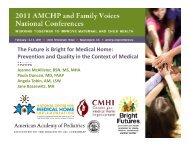
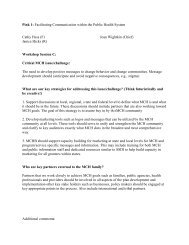

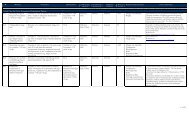
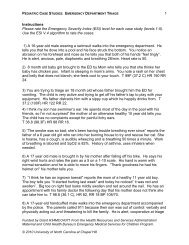
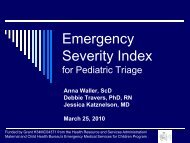
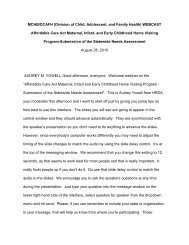
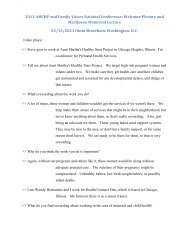
![Hormone Disruptors and Women's Health: Reasons for Concern [PDF]](https://img.yumpu.com/19410002/1/190x245/hormone-disruptors-and-womens-health-reasons-for-concern-pdf.jpg?quality=85)

